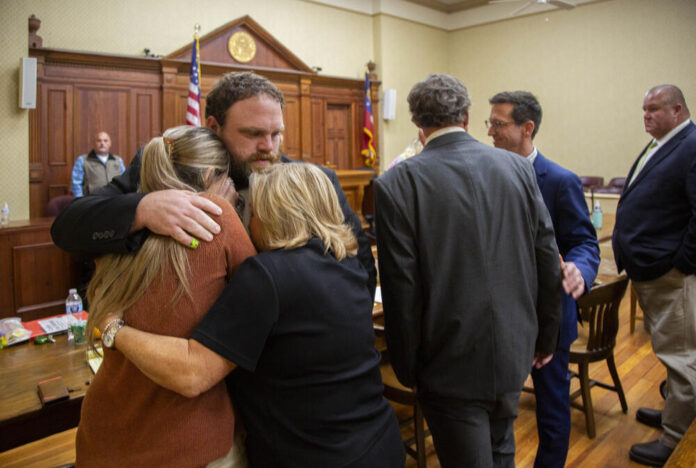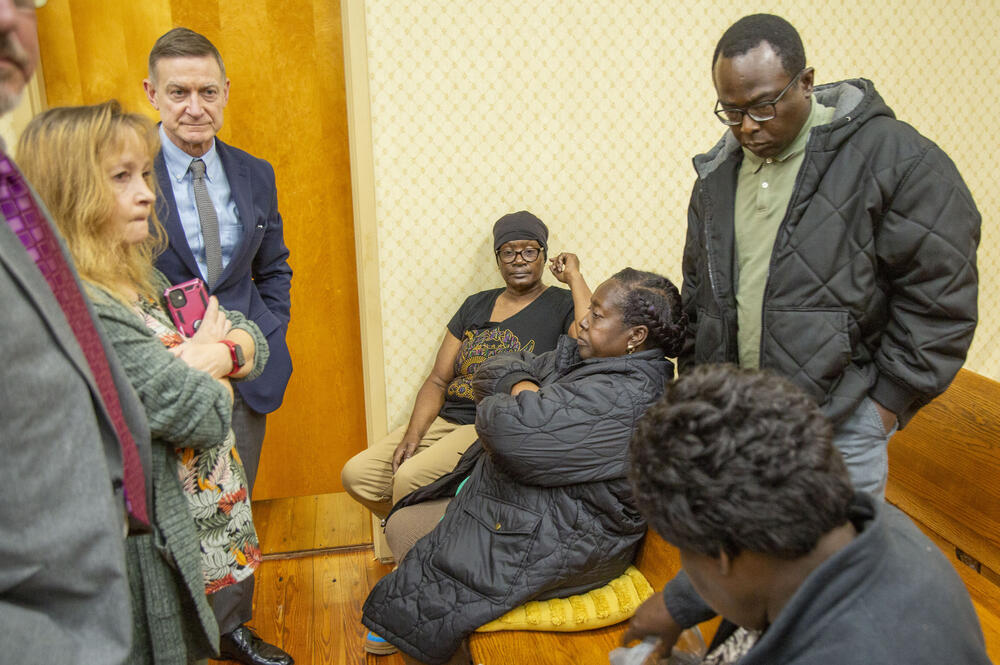
SANDERSVILLE, Ga. — After eight years, a mistrial, and a second trial, a jury in Washington County still failed to reach a unanimous verdict in the murder trial of three former Washington County Sheriff’s deputies charged with felony murder in the 2017 death of Eurie Lee Martin.
The verdicts came after close to seven hours of deliberation, five notes out to the judge and after an assessment from one juror that at least on some counts the jury was “hopelessly deadlocked.” After that, Rhett Scott, Lee Copeland and Michael Howell were essentially free.
The jury returned not guilty verdicts on all four counts — ranging from felony murder to reckless conduct — for Scott. For Howell and Copeland, they returned verdicts of not guilty on charges of felony murder and aggravated assault.
It was on the charges of involuntary manslaughter and reckless conduct that the jury deadlocked and for which mistrials were declared.
Martin died on a blisteringly hot day in July 2017 while on a 30-mile walk from Milledgeville in Baldwin County to Sandersville in Washington County. When he stopped to ask for water at a home on the roadside, the suspicious homeowner called 911, to which deputies Scott, Howell and Copeland all eventually responded.
When Martin would not answer any of their questions, the deputies attempted to subdue him with a Taser brand stun gun, ultimately pulling the triggers on two devices no fewer than 15 times, for about a minute and a half of current sent to Martin’s body in total. An autopsy later performed by a Georgia Bureau of Investigation medical examiner concluded Martin’s death was a homicide — meaning death brought about by other people — during the confrontation.
Attorney and civil rights activist Francys Johnson has represented the family of Eurie Martin since the beginning. He vowed that neither he nor the family were ready to give up.
“As a free man in this country, he should have been able to walk home,” Johnson said. “And they are not finished with that walk with Mr. Martin until they experience some justice.”
He is still pursuing a civil suit in federal court on the family’s behalf, in Georgia’s Middle District. He promised the first filings in that suit would come the day after the verdicts.
Helen Gilbert, Eurie Martin’s sister, was deflated.
“I’m just very disappointed,” Gilbert said. “After eight long years, I’m just very disappointed.”

“We’re elated,” said Karen Scott, Rhett Scott’s mother, about the trial results. “Sorry for the Martin family, but we are just elated.”
In his closing argument to jurors the day before the verdicts, defense attorney Shawn Merzlak argued the stop was a reasonable use of force.
“This case is not ‘poor Mr. Eurie Martin getting tased because he wanted water,’” Merzlak told jurors. “Police officers have a right to detain somebody if they suspect they have committed a crime.”
Defense attorneys accused Martin of two crimes, both misdemeanors: walking in the middle of the road and littering. Merzlak claimed later in the interaction Martin committed assault.
In his final statement to jurors, prosecutor George Lipscomb treated that rationale as absurd.
“They want this to be the standard for your community: People killed for littering?” Lipscomb asked jurors. “People killed by walking in the street? Is that Washington County? Is this who you are?”
Over the course of the trial, it was made apparent that Martin’s body was already under considerable stress from the heat, a pre-existing weakened heart and dehydration when he stopped at the home of Cyrus Harris Jr. to ask for a drink of water.
Harris was one of the first witnesses put on the stand by the prosecution.
“He was a Black man, big guy,” Harris, who is white, recalled of Eurie Martin when he first walked into Harris’ yard. “He was a rough-looking character. He looked like he hadn’t had a bath in several days.”
Harris said he noticed Martin carried half a soda can in his hand, something he’d seen people use as a cup in the past.
“That’s when he told me he wanted some water. And I wasn’t going to go for that,” Harris said.
Once he had shooed Martin from his yard, Harris called 911 to report a suspicious person.
Defense attorney Shawn Merzlak told jurors given Martin’s appearance, it was rational for Harris to be scared.
Talking to Martin’s family after the verdicts were read, Johnson described the deputies’ response to Cyrus Harris’ fear as one part of a larger system.
“Those deputies, I don’t think knew Mr. Martin,” Johnson said. “They showed up that day representing a system, and the system gave them a prescription about what to think about Mr. Martin. How to respond to him, how to kill him successfully, and how to be acquitted of it, how to get away with it. The system did that.”
What Harris didn’t know was that Martin had a history of being treated for schizoaffective disorder and suffered from heart disease, or that earlier, a mail carrier who had passed Martin a number of times on his route had given Martin a bottle of water.
Martin’s sister Helen Gilbert also called 911, worried that her brother was in danger simply from the elements on a 95-degree-day.
“He’s out there in all that weather and he’s a mental patient,” Gilbert was heard saying on the recording of her call played for jurors during closing arguments. “You know, I don’t know whether he’s coming straight or whether he’s, you know, turned up on one of those bad roads.”
By the time Gilbert called 911, her brother was likely already dead.
Defense attorneys built the bulk of their argument around four expert witnesses, all with book-thick credentials associated with the science of the use of tasers. All concluded that they are not deadly weapons.
In his closing, prosecutor Lipscomb attacked those experts. Lipscomb reminded jurors two of the experts serve on the corporate board of Axon, the company which makes the Taser devices deputies used in their attempted detention of Martin, and that, collectively, the experts collected close to $100,000 in fees for their testimony.

Lipscomb said rather than believe the experts when they said Tasers are not deadly weapons, that jurors should read the warning label Axon includes with all their Tasers. It states flatly the devices can cause death when used improperly.
“And y’all, this is their own literature,” Lipscomb said. “And so [the expert] comes here, tells you that these things are safe and that death is not foreseeable. Lo and behold, it has been foreseen.”
A few states have laws regulating the use of paid, expert witnesses in criminal court.
The manner in which the deputies used the weapons in their attempt to detain Martin was captured on video from not only their dash cameras but also on cellphones from passers-by, some of whom were also called to the stand during the trial.
Although the defense claimed Martin assaulted the deputies during the interaction, two of the deputies themselves claimed, and asserted when they took the stand, that any actual violence committed by Martin occurred off camera.
When Lipscomb used the last of his closing argument to ask jurors to watch a piece of bystander video with the sound off, the room went quiet.
From a distance of many yards from the camera, Martin was surrounded by the deputies. A puff of smoke was visible as a Taser cartridge discharged. Martin fell to the ground and flopped like a fish before picking himself up and walking away.
Defense attorney Merzlak called walking away a justification for more force.
“Are law enforcement officers at that point supposed just supposed to say, you know what, this guy doesn’t want to go? We’ll let him go about his business?” Merzlak asked. “Absolutely not.”
Lipscomb saw it differently.
“If they could have just seen a human being in need, and rather than a threat, [Eurie Martin] would still be alive,” he said.
Lipscomb said he has not ruled out prosecuting Michael Howell and Lee Copeland a third time on charges of involuntary manslaughter and reckless conduct.
This article comes to Now Habersham in partnership with GPB News






